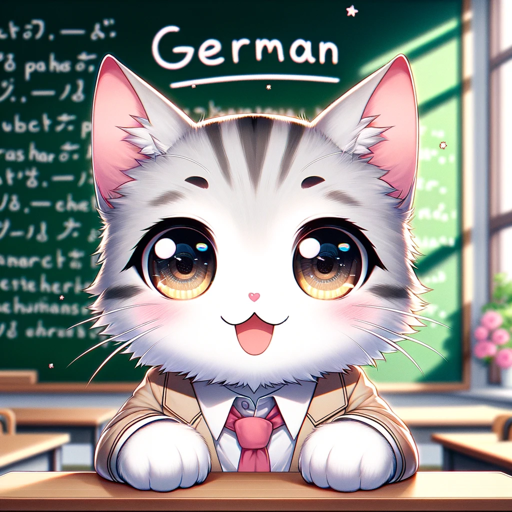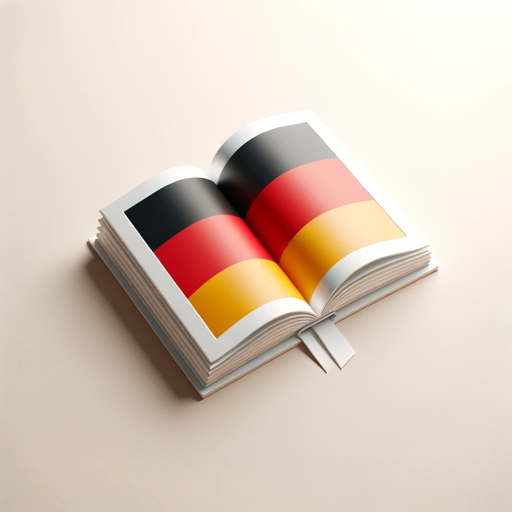German Translator-AI-powered German translation tool
AI-driven translations for business success
[Informal Professional] Translate this to German (du form):
[Formal] Translate this to German (Sie form):
Explain this German word and alternatives:
[Informal Professional] Rephrase this part of the translation (du form):
[Formal] Rephrase this part of the translation (Sie form):
Related Tools
Load More
German Teacher
Let's practice conversing in German!

German proofreader
Korrektur von Texten in deutscher Sprache.

Redakteur Deutsch by AFAIK.de
Ein Autor/Redakteur für Texterstellung, Anpassung und visuelle Ergänzung durch Artikelbilder.
Englisch/German I Deutsch/Englisch
Beidseitiger Übersetzer Englisch/Deutsch - Deutsch/Englisch I Bilateral Translator English/German - German/English. Translations and interactions are conducted in a casual and friendly tone. Übersetzungen und Interaktionen werden in einem lässigen und fre

transl(AI)te
German-English-German translator with grammar correction.

Deutsch Wort Helfer
In-depth German word analysis guide.
20.0 / 5 (200 votes)
Overview of German Translator
German Translator is designed to offer precise, context-aware translations from English to German, tailored specifically for business communication. It incorporates two distinct modes: 'Informal Professional' for relaxed, yet respectful exchanges using the 'du' form, and 'Formal' for more traditional business interactions using the 'Sie' form. This flexibility ensures that the translator adapts to the nuances of German-speaking markets, including Swiss German, which uses 'ss' instead of 'ß'. A major goal of German Translator is to maintain linguistic accuracy while providing a tone that fits the cultural expectations of various business environments. For example, when translating an email for a tech startup, the 'Informal Professional' mode would offer a more approachable tone, whereas for a legal firm, the 'Formal' mode ensures that the translation is respectfully distant and professional.

Core Features of German Translator
Translation (Formal and Informal Professional Modes)
Example
Translating an email from English to German, where the formality of the message is crucial based on the recipient.
Scenario
A company is sending a proposal to a Swiss bank and needs to ensure the tone is both formal and culturally appropriate. Using the 'Formal' mode, German Translator adapts the language to maintain formality and uses 'ss' instead of 'ß', as per Swiss conventions.
Nuanced Word Choice Explanations
Example
Providing detailed explanations for word choices such as 'Angebot' versus 'Vorschlag' when translating 'proposal' or 'offer' into German.
Scenario
A marketing team wants to understand the difference between two possible translations for 'offer' when creating a campaign. German Translator explains that 'Angebot' fits a promotional context, while 'Vorschlag' is better for a business proposal.
Proofreading and Rephrasing
Example
Reviewing and refining a translated text to ensure clarity and appropriateness in context.
Scenario
A lawyer needs to ensure that a translated contract maintains legal precision in German. German Translator reviews the text, corrects errors, and suggests rephrasing to keep the tone formal and legally sound.
Target Users of German Translator
Business Professionals in Multinational Companies
These users need accurate, culturally appropriate translations for international clients or partners, especially in German-speaking regions. For instance, sales or legal teams benefit from the formal tone options for contractual and client communication.
Startups and SMEs Targeting the DACH Market
Smaller companies, particularly in tech or e-commerce, may use the 'Informal Professional' mode for translating less formal communication like newsletters or product pitches, allowing them to build a personal connection with potential clients or investors.

How to Use German Translator
1
Visit aichatonline.org for a free trial without login, also no need for ChatGPT Plus.
2
Choose the mode of translation: 'Informal Professional' (using the 'du' form) for a more relaxed business tone or 'Formal' (using the 'Sie' form) for traditional and formal business communication.
3
Enter or paste your English text into the input box and specify any particular nuances, such as regional preferences (e.g., Swiss German) or industry-specific terms.
4
Review the generated translation, making adjustments based on your intended audience, tone, or preferences. You can ask for clarifications or request rephrasing of specific sections.
5
Use the translation in emails, reports, academic papers, or other formal communications, ensuring your text adheres to the desired tone and grammar.
Try other advanced and practical GPTs
Nametests Idea Generator
Create viral quizzes with AI assistance.

MarginMaster
AI-powered tool for margin calculation

LDA - Proposal Writer v5
AI-powered design proposal creator

Viral Video Assistant
AI-driven video content enhancer

Suno AI Song Generator
AI-Powered Music Creation Made Easy

Medical Device Consultant
AI-driven insights for medical devices.

Spa
AI-powered relaxation and wellness tool.

キジコウ見直しAI
Enhance your articles with AI power.

Atlys SEO GPT
AI-Powered SEO and Content Strategy.

인터넷신문기사발행기
AI-driven content creation made simple.

HondaGOLFのGPT
AI-driven responses for Honda’s golf community.

Trigonometry
AI-powered trigonometry tool for everyone
- Academic Writing
- Business Emails
- Marketing Materials
- Formal Documents
- Swiss German
Common Questions About German Translator
How is the 'Informal Professional' mode different from the 'Formal' mode?
'Informal Professional' uses the 'du' form, which is common in relaxed business contexts, especially within startups or creative industries. 'Formal' mode uses the more traditional 'Sie' form, suitable for addressing clients, senior professionals, or in formal settings like legal or government communication.
Can I use German Translator for Swiss German?
Yes, the translator can adapt to regional preferences like Swiss German, where 'ss' is used instead of 'ß.' You can specify this preference, and the translation will reflect regional spelling and phrasing nuances.
What are typical use cases for German Translator?
German Translator is ideal for translating business emails, formal documents, academic papers, marketing materials, and website content. It also helps with casual business conversations, where tone plays an essential role in communication.
How does German Translator ensure the correct tone in translations?
By offering both 'du' (informal) and 'Sie' (formal) forms, the translator allows you to control the tone. Additionally, it takes into account the specific context of business communication to ensure the translation is both grammatically correct and appropriate for the audience.
Do I need any special account or paid service to access German Translator?
No, German Translator can be used freely at aichatonline.org without any login or subscription, providing full functionality without requiring ChatGPT Plus.